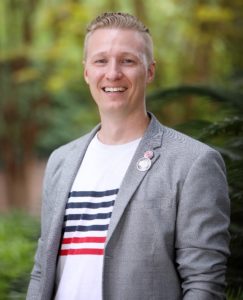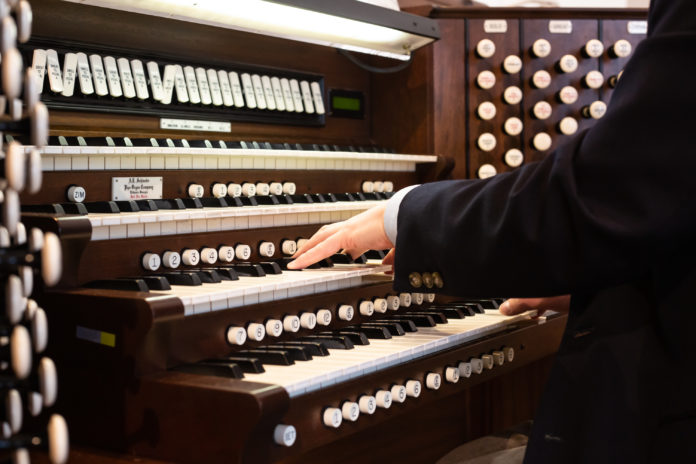Many people see music as an integral part of a church service. But not much is known about the actual role it plays in Christian worship.
One Mercer University professor aims to find out.
“Why do we have music at church? Is it entertainment? Is it for teaching? Is it an attractant? Is it to just sort of uplift and celebrate being human? What is it? Why do we do it?
“These are the questions that are driving the project,” said Dr. Nathan Myrick, an assistant professor of church music in the Townsend School of Music.
Earlier this year, Dr. Myrick was awarded a Vital Worship Grant from the Calvin Institute for Christian Worship. Funds for the $18,000, one-year grant were provided by Lilly Endowment Inc. “to discover the ways that music participates in human flourishing and well-being in Christian communities,” he said.

“For many people and many scholars of Christian music, there is sort of this difficulty in naming the value of music in worship and naming why we should have it,” Dr. Myrick said.
Many argue that music teaches more profoundly than a homily or sermon, he said. People often more easily recall something that they sang, as opposed to something that they heard.
“I’m not sure that necessarily holds up as a reason to have music in church on its own accord because that doesn’t necessarily allow for humans to exercise their agency and determine what they might, or might not, want to believe,” Dr. Myrick said. “But if we can focus on something else about music, we can talk about ways that maybe we could have healthier worship.”
Church music should have value to everybody, he said. But sometimes musicians, who are often volunteers, get burnt out or put in vulnerable situations when their views may not exactly align with the music they are performing.
“If I can draw out tangible things that music participates in, and if we can start thinking about music as not necessarily a teaching tool or not necessarily an attractant but as something that contributes to the health of a community, then to me, that’s a much more compelling and hopeful way of approaching church music research,” he said.
Dr. Myrick and his team of two graduate research assistants have built a database of more than 200 churches within a 30-mile radius of Mercer’s Macon campus. Using that list, they’ll reach out to churches to see who might be interested participating in the research.
No musical style is off-limits. The team will study everything from contemporary worship music to Westminster and Anglican choral music to Baptist hymnody.
“Music can be good and beautiful and contribute to well-being and flourishing regardless of style,” Dr. Myrick said.
Church music often involves singing, and the COVID-19 pandemic presents a challenge to studying that. Many churches have scaled back or stopped singing during worship due to its potential to be a superspreading event. In addition, some churches are meeting virtually.
“We have an opportunity now to do research with people and congregants who aren’t singing,” Dr. Myrick said. “And we get to say, ‘Hey, what is it like now to not sing? And what is your perception of the activity of doing music with other people now that you don’t have it?’”
Graduate research assistant Johnathan Alvarado, who is pursuing a Master of Church Music at Mercer, said he’s always been invested in “developing liberating spaces for people to exercise self-agency and control of their own bias.”
The project piqued his interest because not all Christian communities reflect those types of open spaces.
“Racial biases, sexuality biases, gender biases — all those things exist in Christian communities, and the music either reflects that or promotes that,” he said.
As a music minister and worship leader at Grace Church International in Atlanta, Alvarado also is interested in learning how he can make his own church more welcoming.
“I want to see in what ways can I make my church a more welcoming environment, a more freeing environment, a liberating environment for people regardless of their sexual orientation, their gender, their race, regardless of their politics, any of those things,” he said. “Anything that I can do to promote human well-being and human flourishing even in my own Christian community, I see as a direct benefit of the project.”
The team will share its findings with the research participants so the churches can see how their own congregations understand music in worship. In addition, Dr. Myrick and his graduate research assistants will write a chapter, titled “Music and Human Flourishing,” in a new volume, “The Oxford Handbook of Community Singing.”
Church music “can be something that contributes to the vibrancy and life of Christian communities and to the civic engagement that church can have,” he said. “And that’s something that I want to call out and to kind of celebrate with this research project.”










